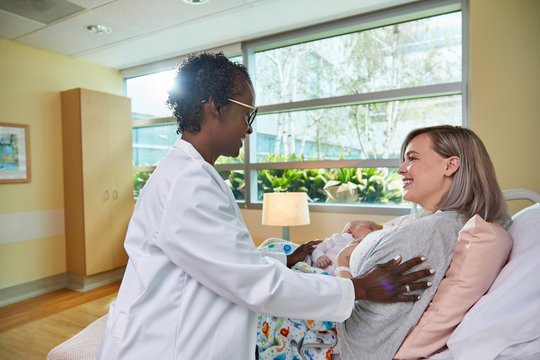
Few pregnant women admitted for delivery have COVID-19
New research shows that few women admitted to Kaiser Permanente Southern California hospitals to give birth this spring tested positive for COVID-19. Those who did were asymptomatic, and none passed on the infection to their newborns.
“We had heard from our colleagues in New York about the high rate of COVID-19 among pregnant women coming to the hospital to deliver,” said the study’s lead author Michael Fassett, MD, an obstetrician at Kaiser Permanente West Los Angeles Medical Center, “but here in Southern California we observed a much lower rate. This could be due to early implementation of statewide prevention guidelines including social distancing, handwashing, and use of masks, and because the pregnant women carefully adhered to safety guidelines.”
The study was published July 3, 2020, in the American Journal of Perinatology. In the study, researchers looked at the electronic health records of 3,963 women who delivered between April 6 and May 11, 2020, in Kaiser Permanente Southern California hospitals. Of that ethnically diverse group, only 17, or 0.43%, had a positive SARS-CoV-2 test at the time of admission to the hospital. (In one New York study, 13.5% of the women admitted to the hospital to give birth tested positive for the virus.)
Of the women in the Southern California study:
- None were symptomatic on admission, although one developed a headache a few days later.
- Women with positive SARS-CoV-2 tests tended to be over 30 years of age.
- No newborns tested positive for the virus.
“The absence of positive test results in this small group of neonates delivered to asymptomatic, SARS-CoV-2 positive women is reassuring,” Dr. Fassett said. “It suggests that the likelihood of vertical or intrapartum transmission of SARS-CoV-2 is very low.”
Darios Getahun, MD, PhD, a researcher with the Kaiser Permanente Southern California Department of Research & Evaluation noted that one other interesting fact of the study was how many women consented to the SARS-CoV-2 test.
“Of women who delivered during the study period, 99% had the SARS-CoV-2 test,” Dr. Getahun said. “That tells us that Kaiser Permanente Southern California’s universal screening of pregnant women for the SARS-CoV-2 infection was very successful.”
Dr. Fassett said that this research can help guide obstetrical care and the use of personal protective equipment in the obstetrics ward, as well as general public health measures.
In their next study, Dr. Fassett and Dr. Getahun expect to look at the rate of SARS-CoV-2 infection and related adverse pregnancy outcomes among all pregnant women within Kaiser Permanente Southern California.
Other physicians and researchers who contributed to the study include Lawrence Lurvey, MD, JD, Southern California Permanente Medical Group; Lyn Yasumura, MD, Kaiser Permanente Baldwin Park Medical Center Obstetrics and Gynecology; Marielle Nguyen, MD, Kaiser Permanente Anaheim Medical Center Neonatal Medicine; Joseph Colli, MD, Kaiser Permanente South Bay Medical Center Neonatal Medicine; Marianna Volodarskiy, RN, MSN, Kaiser Foundation Hospitals; Jonathan Gullett, MD, Southern California Permanente Medical Group Regional Reference Laboratories; David Braun, MD, Kaiser Permanente Southern California Research & Evaluation; Alex Fong, Kaiser Permanente Orange County–Irvine Medical Center Maternal-Fetal Medicine; Neha Trivedi, MD, Kaiser Permanente San Diego Medical Center Maternal-Fetal Medicine; Katia Bruxvoort, PhD, MPH, Kaiser Permanente Southern California Research & Evaluation; and Vicki Chiu, MS, Kaiser Permanente Southern California Research & Evaluation.





